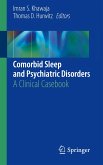According to research, more than 50% of patients seen in psychiatric clinics have sleep problems. Despite this fact, there is a lack of sleep medicine training in psychiatric residency programs especially for disorders like insomnia and sleep-related problems in women and children. Also, there is a lack of education on treating sleep problems in special situations like ICU settings or managing sleep problems via telemedicine. Sleep physicians, on the other hand, are uncomfortable treating patients with the psychiatric disorders, particularly in this demographic. Pediatricians are also not trained to work with children suffering from sleep disturbances or psychiatric disorders. They often struggle to correctly identify a particular disorder and lack confidence to adequately treat and manage these issues. In total, there are only about 250 clinicians trained in both sleep medicine and psychiatry, despite the millions of patients who could benefit from both disciplines.
While Springer does have a forthcoming text on sleep and psychiatric disturbances that addresses comorbid sleep disorders in the general population, there is still no resource that examines the intricacies of insomnia in women and children. This text highlights the importance of common medical comorbidities and illuminates the salient points for treatment, diagnosis, and management of these conditions as they relate particularly to these special populations. Written by experts in both sleep medicine and psychiatry, the text takes a cutting-edge, reader-friendly approach to topics that include sleep disturbances in pregnancy, sleep tele-medicine, sleep disturbances related to difficulties in schools, and substance-induced disturbances. Each chapter follows a consistent format, making it an excellent tool for the busy clinician who is not able to sift through scientific literature or didactic texts.
Psychiatric Sleep Disorders in Women and Children is an excellent resource for all clinicians who may work with special populations struggling with sleep and psychiatric comorbidities, including psychiatrists, sleep medicine physicians, internists, primary care and family medicine physicians, pediatricians, obstetrics/gynecologists, psychologists and others.
While Springer does have a forthcoming text on sleep and psychiatric disturbances that addresses comorbid sleep disorders in the general population, there is still no resource that examines the intricacies of insomnia in women and children. This text highlights the importance of common medical comorbidities and illuminates the salient points for treatment, diagnosis, and management of these conditions as they relate particularly to these special populations. Written by experts in both sleep medicine and psychiatry, the text takes a cutting-edge, reader-friendly approach to topics that include sleep disturbances in pregnancy, sleep tele-medicine, sleep disturbances related to difficulties in schools, and substance-induced disturbances. Each chapter follows a consistent format, making it an excellent tool for the busy clinician who is not able to sift through scientific literature or didactic texts.
Psychiatric Sleep Disorders in Women and Children is an excellent resource for all clinicians who may work with special populations struggling with sleep and psychiatric comorbidities, including psychiatrists, sleep medicine physicians, internists, primary care and family medicine physicians, pediatricians, obstetrics/gynecologists, psychologists and others.








